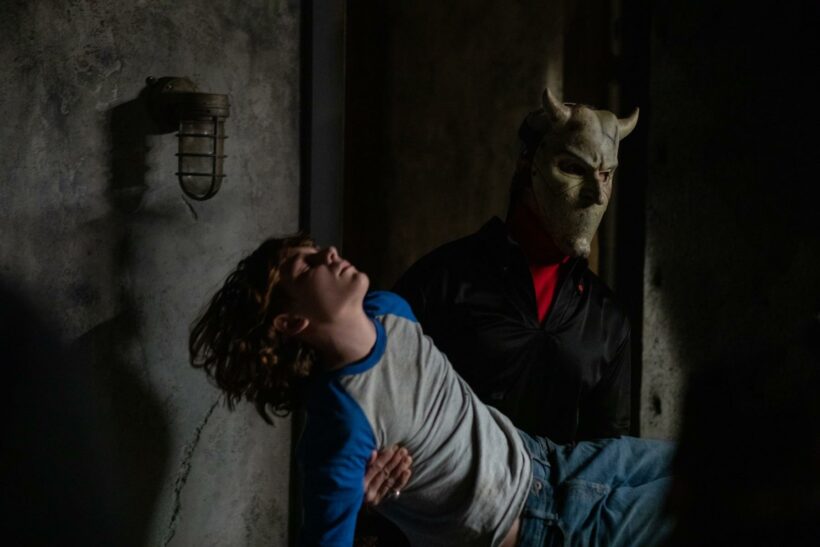What serial killer worth his weight in dismembered corpses would be happy with a moniker as uncreative and flatly descriptive as “the Grabber?” That’s the name either a lazy detective or a reporter on deadline has bestowed upon the 1970s child-murdering villain Ethan Hawke plays in The Black Phone, a gloomy new Blumhouse thriller from director Scott Derrickson (Sinister, Doctor Strange). At least the killer looks creepy enough, issuing casual threats from behind a kabuki-like mask that magically changes expression to match his shifting moods. We’re guessing it slumped out of toothy rictus grin and into a pouty frown when the bad guy first saw his unchosen nom de guerre splashed across a front page.
Related Stories
'Moon Knight' Is Oscar Isaac's MCU Debut — and Kind of a Mess
Jeff Tweedy Digs Up Unreleased Tracks for Reissue of 'Chelsea Walls' Soundtrack
Related Stories

RS Recommends: 5 Devices You Need to Set Up Your Smart Home
The United States of Weed
The Grabber seems to have put most of his creative energy towards his facewear. There’s nothing terribly distinctive or elaborate about his methods, which amount to locking kids away in his dungeon, taunting them with condescending remarks, and then just kind of waiting for them to mount a feeble escape attempt, after which he can justify doing his grisly thing. Hawke brings a certain spooky nonchalance to the role, conveying the mundanity of evil through the uninflected naturalism of his delivery. But he’s playing a rather low-concept psychopath, too lethargic to develop much of a gimmick or even the impression of a fearsomely fucked-up pathology.
Much of the movie takes place in that aforementioned dungeon: a soundproofed basement with a dirty mattress, a single high window, and the rotary device of the title. It’s here that 13-year-old Finney (newcomer Mason Thames) is dismayed to discover that he’s joined the gallery of kids with their names and faces plastered on posters all over town. Finney, a quiet loner type, might be doomed to meet the same fate as those before him were it not for a rather literal lifeline: That supposedly non-functioning phone periodically rings, and on the other end are the voices of the Grabber’s slain victims, all offering advice on how the boy might avoid making the same mistakes they did and capitalize on their combined knowledge of the property.
The premise is reasonably clever and gripping. It comes from a short story by Joe Hill, son of none other than Stephen King. The Grabber’s hunting grounds are the northern suburbs of Denver circa ’78, all bell bottoms, FM radio hits and rabbit-ear TVs. But any viewer up on their tales of missing kids in deceptively idyllic small-town America could be forgiven for mistaking this real place for one of King’s haunted Maine burgs. Mean bullies, abusive and neglectful grownups, tween losers racing away on their bicycles — it’s all very Derry. In fact, the movie often plays like another Stranger Things dilution, watering down the paperback thrills of literature’s reigning master of horror into an inferior throwback substitution. Do we mention that the Grabber lures his prey with a bundle of black balloons?
Hill, to his credit, doesn’t offer quite so many blatant nods to his father’s work. On the page, The Black Phone is ruthlessly efficient — a lean, mean, 30-page survival yarn, King-ish mostly in its punchy prose. But in expanding this short story into a feature-length movie, Derrickson fatally slackens the tension. His script, co-authored with regular collaborator C. Robert Cargill, lingers on generic coming-of-age business before getting to the kidnapping, then keeps cutting away from Finney’s dilemma for curiously perfunctory scenes with his clairvoyant, annoyingly precocious little sister (Madeleine McGraw), who curses like a sailor and “comically” bargains with Jesus. The bumbling local cops seem to gather all their leads from her vaguely promontory dreams. Also ineffectually on the case is an amateur gumshoe (ace character actor James Ransone) too dim to realize just how close to the truth he really is. Where’s Clarice Starling, or even a nominally competent manhunter, when you need her?
Derrickson, returning to his genre roots after a brief toil in the Marvel content mill, is capable of tauter entertainment. A decade ago, he corralled both Hawke and Ransone into Sinister, a much more effective Stephen King riff about children imperiled by a malevolent stalker. That horror movie had real ideas about the divided priorities of its protagonist, a writer endangering his family for the sake of his breadwinning work. More importantly, perhaps, it was just really scary — an expertly paced haunted-house movie that used snippets of celluloid surveillance to worm effortlessly under the viewer’s skin.
The Black Phone, which similarly steers into the occasional 8mm-stock detour, only gets a few drops of genuine suspense from its familiar conceit. The ending is an easy layup, all but guaranteed to inspire applause, but it could have really killed if the Grabber’s gauntlet of terror, well, grabbed us harder throughout. The guy’s an eerie mask in search of a bona fide bogeyman; he’s no more genuinely unsettling than what you’d find lining the strip-mall shelves of a Spirit Halloween. And to pull back the film’s own Pennywisian mask of derivative fright-making is to find nothing much underneath.
Source: Read Full Article
